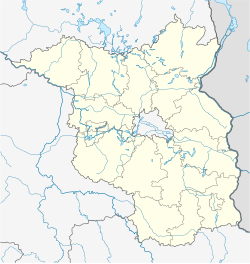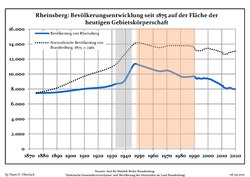world.wikisort.org - Germany
Rheinsberg (German: [ˈʁaɪ̯nsˌbɛɐ̯k] (![]() listen)) is a town and a municipality in the Ostprignitz-Ruppin district, in Brandenburg, Germany. It is located on lake Grienericksee and the river Rhin, approximately 20 km north-east of Neuruppin and 75 km north-west of Berlin.
listen)) is a town and a municipality in the Ostprignitz-Ruppin district, in Brandenburg, Germany. It is located on lake Grienericksee and the river Rhin, approximately 20 km north-east of Neuruppin and 75 km north-west of Berlin.
Rheinsberg | |
|---|---|
Town | |
 Schloss Rheinsberg | |
 Coat of arms | |
Location of Rheinsberg within Ostprignitz-Ruppin district  | |
 Rheinsberg  Rheinsberg | |
| Coordinates: 53°5′54″N 12°53′45″E | |
| Country | Germany |
| State | Brandenburg |
| District | Ostprignitz-Ruppin |
| Subdivisions | 17 Ortsteile |
| Government | |
| • Mayor (2017–25) | Frank-Rudi Schwochow[1] |
| Area | |
| • Total | 324.83 km2 (125.42 sq mi) |
| Elevation | 61 m (200 ft) |
| Population (2020-12-31)[2] | |
| • Total | 7,948 |
| • Density | 24/km2 (63/sq mi) |
| Time zone | UTC+01:00 (CET) |
| • Summer (DST) | UTC+02:00 (CEST) |
| Postal codes | 16831 |
| Dialling codes | 033931 |
| Vehicle registration | OPR |
| Website | www.rheinsberg.de |
History

Frederick the Great, while still Crown Prince, designed and moved into a restored chateau in Rheinsberg shortly after his 1733 marriage to Elisabeth Christine of Brunswick-Bevern. Here he experienced his "Rheinsberg Period", an era marked by regular correspondence with Voltaire, boisterous celebration in the company of minor philosophers and musicians, and the writing of several works of political theory, including the Anti-Machiavel.[3]
In 1870, the painter Eduard Gaertner and his family decided to leave the hectic atmosphere of Berlin and settle in Flecken Zechlin, a suburb of Rheinsberg - where he lived until his death in 1877.
Rheinsberg is the location for Kurt Tucholsky's Rheinsberg, a 1912 picture book for lovers based on an autobiographical weekend trip.
Demography
 Development of population since 1875 within the current Boundaries (Blue Line: Population; Dotted Line: Comparison to Population development in Brandenburg state; Grey Background: Time of Nazi Germany; Red Background: Time of communist East Germany)
Development of population since 1875 within the current Boundaries (Blue Line: Population; Dotted Line: Comparison to Population development in Brandenburg state; Grey Background: Time of Nazi Germany; Red Background: Time of communist East Germany) Recent Population Development and Projections (Population Development before Census 2011 (blue line); Recent Population Development according to the Census in Germany in 2011 (blue bordered line); Official projections for 2005-2030 (yellow line); for 2017-2030 (scarlet line); for 2020-2030 (green line)
Recent Population Development and Projections (Population Development before Census 2011 (blue line); Recent Population Development according to the Census in Germany in 2011 (blue bordered line); Official projections for 2005-2030 (yellow line); for 2017-2030 (scarlet line); for 2020-2030 (green line)
|
|
|
Geography
Lakes
Photogallery
- Monument opposite castle
- Castle seen from monument place
- Concerthall (part of the castle)
- Church in Dierberg
- Fire engine house in Heinrichsdorf
Twin towns
 Huber Heights (Ohio, USA)
Huber Heights (Ohio, USA)
People from Rheinsberg
- Gad Granach (1915–2011), German writer
- Erhard Egidi (1929–2014), German cantor, composer and organist
- Lothar Baumgarten (1944–2018), German artist
References
- Landkreis Ostprignitz-Ruppin Wahl der Bürgermeisterin / des Bürgermeisters, accessed 2 July 2021.
- "Bevölkerung im Land Brandenburg nach amtsfreien Gemeinden, Ämtern und Gemeinden 31. Dezember 2020". Amt für Statistik Berlin-Brandenburg (in German). June 2021.
- MacDonogh, Giles (1999). Frederick the Great: A Life in Deed and Letters. New York: St. Martin's Griffin. pp. 98–129. ISBN 0-312-27266-9.
- Detailed data sources are to be found in the Wikimedia Commons.Population Projection Brandenburg at Wikimedia Commons
External links
- Official website
 (in German)
(in German)
На других языках
[de] Rheinsberg
Rheinsberg ist eine Stadt im Landkreis Ostprignitz-Ruppin in Brandenburg, gelegen am Rhin, einem Nebenfluss der Havel. Die Kernstadt mit den Ortsteilen Kleinzerlang und Flecken Zechlin trägt das Prädikat Staatlich anerkannter Erholungsort. Rheinsberg gehört zu den nach Fläche größten Gemeinden Deutschlands.- [en] Rheinsberg
[es] Rheinsberg
Rheinsberg es una ciudad y municipio en el distrito de Ostprignitz-Ruppin, en Brandeburgo, Alemania. Está situada a orillas del río Rhin, aproximadamente a 20 km al noroeste de Neuruppin y a 75 km al noroeste de Berlín.[ru] Райнсберг
Ра́йнсберг (нем. Rheinsberg) — город в Германии, в округе Восточный Пригниц — Руппин федеральной земли Бранденбург. Город стоит на реке Рин и является известным местом отдыха. По занимаемой площади Райнсберг стоит в одном ряду с Бременом и Дрезденом и является одной из (территориально) крупнейших общин Германии.Другой контент может иметь иную лицензию. Перед использованием материалов сайта WikiSort.org внимательно изучите правила лицензирования конкретных элементов наполнения сайта.
WikiSort.org - проект по пересортировке и дополнению контента Википедии







